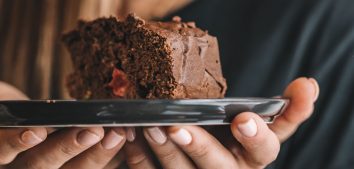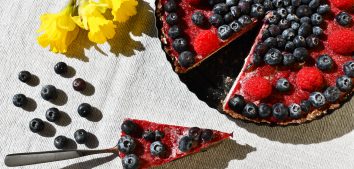
Sugar addiction – how to deal with it?
I have often confessed to my indulgence in sweets because… I adore them 🙂 I talk about it openly because I think that most people also do it and we have always associated sweets with something pleasant. The pleasure is justified because while eating, our body activates the reward system where opioids, such as endorphin, enkephalin and dopamine, play an important role. It is a common myth that if you lead a healthy lifestyle, you must absolutely exclude all sweets.
I couldn’t disagree more.
There is nothing wrong with sweets if you know how to set the limit and eat snacks that are nutritious. After all, each of us can indulge in sweet pleasures from time to time. The secret is not to exceed the reasonable amount and to make good choices: choose healthy equivalents of sweets and try to prepare them yourself 🙂 If you’re looking for some inspiration for fit snacks, you’ill find healthy recipes for sweets here.
Although you can choose healthier options, the old rule “too much of a good thing” also applies here. Sweet snacks, just like all substances (caffeine, alcohol, drugs, medicines) can lead to addiction. Can you get addicted to chocolate or bars? Of course you can!
More and more people suffer from chocoholism, and because it is not easily noticeable like e.g. alcoholism, the problem is often not taken seriously. However, in extreme cases, it can be just as dangerous as any other addiction and shouldn’t be ignored.
How do I know that eating sweets is an addiction?
- Sweets appear in your diet practically every day.
- You feel a strong need, or even pressure, to have something sweet, which is often experienced as a strong inner feeling similar to hunger and is combined with the urge to satisfy the need.
- You feel anxious that you won’t be able to live for a longer period of time without having something sweet to eat.
- You feel uneasy when you don’t eat anything sweet.
- You begin to control emotions with sweets (e.g. you eat to have a better mood, when something wrong is going on, when you’re nervous).
- You get angry when someone points out that you eat too many sweets.
- You often think about something sweet.
- When you don’t know how to deal with something, you instinctively reach for sweets.
- Eating sweets satisfies your other needs (apart from the one connected with taste).
- When you feel like having something sweet, you can’t focus on anything until you satisfy the craving.
- Sometimes you find it hard to control the amount of sweets you consume.
- Although your health tells you to STOP, (e.g. you suffer from insulin resistance, diabetes, excess weight, obesity), you still can’t quit.
Why addiction to sweets can be a problem?
Most of the sweets available in shops (such as cookies, chocolate, bars) contain a lot of unhealthy types of fat – the so called trans isomers, which increase the risk of developing cardiovascular disease, insulin resistance, obesity, or type 2 diabetes. What is more, they lead to an increase in cholesterol – the general one as well as the bad one (LDL fraction) and reduce the level of good cholesterol (HDL fraction). Excess sugar increases the risk of developing caries and can lead to fatigue, lack of strength and energy for everyday activities, changes in mood and skin problems.
Addiction also has psychological consequences. In case of sweets you can be addicted to the very substance, that is sugar, or to the ritual, e.g. always eating something sweet in a stressful situation or as a reward for success. What is important is the psychological state induced by eating sweets. Unfortunately, if it is addiction, then it is usually very hard to achieve it in another way.
What is the role of hormones?
You probably wonder if hormones play a part in your craving for sweets. They do, and the influence is bigger than you think 🙂 In many situations our hormonal balance freaks out and as a result we are more prone to eating carbohydrates – especially in the form of sweet snacks. One of the effects is tiredness and not enough sleep. Sleep deprivation leads to secretion of excessive amounts of ghrelin – the hormone that is responsible for your appetite. Research has shown that after a sleepless night people eat more the following day, especially high-carbohydrate snacks. Cortisol works in a similar way and is activated in situations of tension and stress. People who suffer from cortisol imbalance may experience an increased appetite for sweetness. It is worth noting that the higher the level of cortisol in the blood, the greater the resistance to insulin and this results in faster deposition of adipose tissue. Serotonin is also important here. In situations of low mood, when the level of serotonin drops drastically, we also naturally strive to level it and eat more… carbohydrates, especially sweets.
10 ways to deal with sugar addiction
I have some good news for you. You can deal with addiction to sweets! What’s more, research has shown that people who cut out sugar, quit ready-made sweets and replaced them with healthier snacks, began to feel the sweet taste more intensely 🙂 Below you will find a list of ten tips that you may find helpful in coping with the “sweet poison”.
1. Get rid of unhealthy, processed sweets
If you think that you can keep a packet of biscuits or a bar of chocolate hidden deep in your closet and you’ll only use it in a moment of weakness, …. you’re wrong 🙂 Clear all your cupboards of unhealthy sweet snacks and replace them with those that contain natural ingredients.
2. Start making your own healthier sweets
Amaranth cookies? Fluffy chocolate-banana mousse? Or maybe a coconut pudding? Sounds familiar? It tastes amazing! Replace chocolate bars with a banana brownie and your body will thank you for that immediately.
3. Do more exercise!
Dopamine, serotonin and other neurotransmitters occur not only after eating chocolate. Physical activity also launches the whole biochemical process and often works better than chocolate, the only difference being its effect is not so immediate. If you would like to work out with me, use my application Diet & Training by Ann.
4.Cut out artificial sweeteners
Do you know that the more sweet substances we consume, the weaker our tolerance for the sweet taste becomes? And as a result we crave for more. Replace sugar and sweeteners with dates, for example. Sweeten your mousse with a banana. You’ll notice the difference in taste after a few days.
5. Appreciate yourself
Start celebrating your small successes. Have you managed not to buy any sweets for one day? Great! Remember, do it slowly and step by step.
6. Look for other ways to deal with stress
If you tend to eat in stressful situations, find some other ways to deal with it! Take it easy, meditate, do sport. I wrote more on that topic here.
7. Be aware
Try to be aware in what situations you usually reach for sweets. Is it in the evening? At work? When you’re bored? Being aware of it will help you react, as it is much easier to know your enemy.
8. Get support
It could be your friend, partner, anyone. Of course you are the one who’s responsible most, but it is just as important to feel that you’re not alone with the challenge.
9. Hold on for at least 21 days
Don’t get discouraged that something is wrong right at the start. It takes time to get into a habit, sometimes even much more than 3 weeks. After this time, first changes in taste become noticeable. So if you want to make sure if something works or not, promise me you’ll hold on.
10. Don’t procrastinate. Start now
The time will never be just right. Don’t put off the decision, don’t wait until Monday, next month or the New Year. Now is your time! Think what you can do for yourself today 🙂
References:
- Ashley N. Gearhardt, MS, MPhil; Sonja Yokum, PhD; Patrick T. Orr, MS, MPhil; et al. Neural Correlates of Food Addiction, Arch Gen Psychiatry 2011;68(8):808-816.
- Ayaz A, Nergiz-Unal R, Dedebayraktar D, et.al. How does food addiction influence dietary intake profile? PLoS One. 2018 Apr 20;13(4): e0195541.
- Ogińska-Bulik, Wiem co jem. Psychologia nadmiernego jedzenia. Wydawnictwo Uniwersytetu Łódzkiego, Łódź, 2016.










Comments No Comments
Join the discussion…